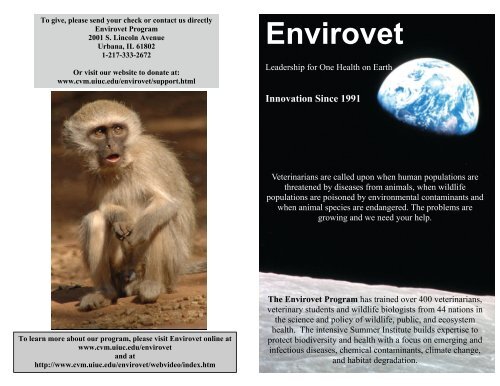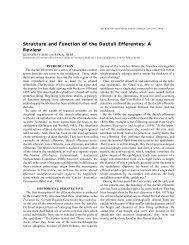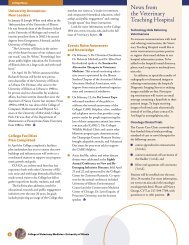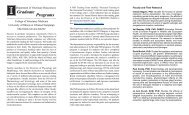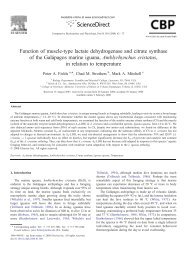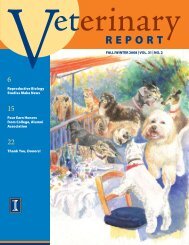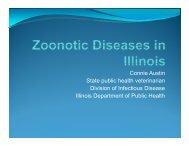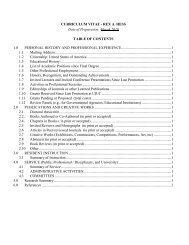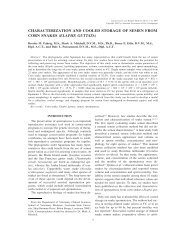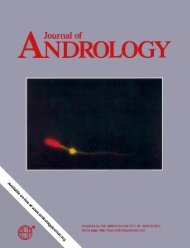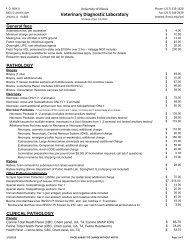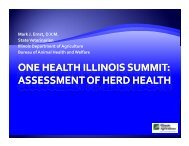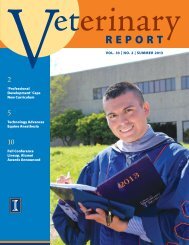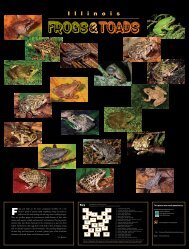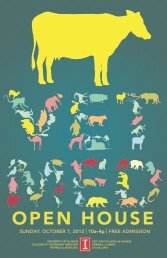Envirovet - University of Illinois College of Veterinary Medicine
Envirovet - University of Illinois College of Veterinary Medicine
Envirovet - University of Illinois College of Veterinary Medicine
- No tags were found...
Create successful ePaper yourself
Turn your PDF publications into a flip-book with our unique Google optimized e-Paper software.
<strong>Envirovet</strong> instruction is state-<strong>of</strong>the-artand relevant. TheSummer Institute brings today’sissues and career possibilitiesinto the very best teachingfacilities. <strong>Envirovet</strong> engages ourstudents in lectures, labs, andfield exercises 60-70 hours aweek, for eight weeks.<strong>Envirovet</strong> is taught by a worldclassfaculty <strong>of</strong> engaged andengaging pr<strong>of</strong>essionals fromacademia, government, nongovernmentalorganizations andprivate industry. Faculty donatetheir effort and serve as mentorsfor <strong>Envirovet</strong>’s uniquelyqualified student body, who arelargely veterinary students andveterinarians from the worldover.You can help endow <strong>Envirovet</strong>.Funding an endowment would ensurethat <strong>Envirovet</strong> fulfills its mission foranimals and people — long-term!Photograph by Mark Anderson<strong>Envirovet</strong> takes place in threesessions. The First Session is held atThe White Oak Conservation Centerin Florida and on St. Catherine’sIsland, Georgia. The Second Sessiontakes place at Harbor BranchOceanographic Institution, near FortPierce, Florida.<strong>Envirovet</strong> is currently made possible through the generoussupport <strong>of</strong> our benefactors:• <strong>Envirovet</strong>’s World-Class Faculty• The Howard Gilman Foundation• White Oak Conservation Center• Harbor Branch Oceanographic Institution• The Nathan Cummings Foundation• Eli Lilly and Company• The Raynie Foundation• The World Wildlife Fund• The <strong>University</strong> <strong>of</strong> <strong>Illinois</strong>• The <strong>University</strong> <strong>of</strong> California-Davis• Dr. Kim Hammond• Wildlife Conservation Society• United States Agency for International Development
Can you help us help wildlife and public health?You can help a veterinary studentfrom North America. We have manyoutstanding students who want toattend <strong>Envirovet</strong>, but they lack thefinancial means to cover the coursecosts. Funding would enable theseworthy students to attend the mostcomprehensive ecosystem healthcourse in the world today.You can help a youngveterinary pr<strong>of</strong>essional fromthe developing world.<strong>Envirovet</strong> needs support totrain participants fromdeveloping countries, forexample Ethiopia, Rwanda,Ecuador, Viet Nam,Indonesia, and Sri Lanka. Incountries such as these, ayear’s salary may be only afew hundred dollars—or less.It is impossible to state how crucial it is for these pr<strong>of</strong>essionals to receivestate-<strong>of</strong>-the-art training in ecosystem health and conservation. With yourdonation, <strong>Envirovet</strong> can do the job.You can help initiate a regionalprogram. <strong>Envirovet</strong>’s plannedregional programs in the Arctic,Africa, Asia and Latin America arepoised to protect their ecosystems— and the animal and humanpopulations they support. Fundingwill help them to head <strong>of</strong>f wildlifehealth problems before theybecome human health problems.Every year, <strong>Envirovet</strong> helps promisingwildlife- and conservation-orientedveterinarians and veterinary students attendthe Summer Institute. A contribution to<strong>Envirovet</strong> ensures that these pr<strong>of</strong>essionalsreceive the training required to protecthuman and wildlife populations as well asthe ecosystems on which both depend.The Third Session isorganized in a developingcountry. To date it has beenstaged in Kenya, Brazil,South Africa, and Swaziland.<strong>Envirovet</strong>’s approach iseffective. Graduates <strong>of</strong> theSummer Institute lead effortsto identify and correctenvironmental, wildlife andpublic health problems in theAmericas, Europe, Africa,Asia and many islandnations.In addition to the broadbasedSummer Institutes,<strong>Envirovet</strong> is buildingregional programs aroundthe globe. <strong>Envirovet</strong>Baltic brings expertstogether from nationssurrounding the Baltic Sea.We are currentlyassembling new expertgroups for Africa, Asia,Latin America, and theArctic.
A Few <strong>of</strong> <strong>Envirovet</strong>’s Student Success StoriesDr. Cheryl Rosa completed aresidency in wildlife medicine and aPhD in marine mammal toxicologyat the <strong>University</strong> <strong>of</strong> Alaska-Fairbanks. She is now WildlifeVeterinarian for the North Slope Borough, alargely indigenous community the size <strong>of</strong>Texas with headquarters in Barrow, Alaska.Dr. Todd O’Hara is an AssociatePr<strong>of</strong>essor at the <strong>University</strong> <strong>of</strong>Alaska and an internationallyknownmarine mammaltoxicologist in the Arctic.Dr. Julio Mercado was a zoo veterinarianat the Mexicali Zoo, taught wildlife ecologyand medicine in Baja California, guidedfield and laboratory studies <strong>of</strong> rabies inbats, and is field veterinarian <strong>of</strong> theCalifornia condor reintroduction program in BajaCalifornia, Mexico.Dr. Alonso Aguirre studied health problems <strong>of</strong>endangered sea turtle diseases and Hawaiianmonk seals. He is Director for Conservation<strong>Medicine</strong> for Wildlife Trust, USA, teachesconservation medicine at Tufts School <strong>of</strong><strong>Veterinary</strong> <strong>Medicine</strong>, and at Columbia <strong>University</strong>'s Centerfor Environmental Research and Conservation. Heorganizes conservation courses in Latin America, Europe,and the US. He is also editor <strong>of</strong> the book Conservation<strong>Medicine</strong>: Ecological Health in Practice.Dr. Fernando Nassar-Montoya is Director <strong>of</strong>the Centro de Primatologia Araguatos, in Bogota,Colombia, which intercepts wildlife confiscatedfrom animal traffickers and returns themto the wild when it can be done safely.Dr. Erika Alandia Robles is a veterinarian andconsultant for the Wildlife Conservation Society aspart <strong>of</strong> their Field <strong>Veterinary</strong> Program in the GreaterMadidi Landscape Conservation Program <strong>of</strong> theBolivian Amazon. She works with indigenouspeople who live on the perimeter <strong>of</strong> a national park.Dr. Catia Dejuste de Paula completed a MS in epidemiologyat the <strong>University</strong> <strong>of</strong> Sao Paulo, and is now completing aPhD studying endangered amphibians. She has worked asan environmental consultant, in wildlife rehabilitation, for theBrazilian Institute for Conservation <strong>Medicine</strong>, for IBAMA, theBrazilian Natural Resource Agency, and in the Center for WildlifeConservation at theSao Paulo Zoo.Dr. Leslie Dierauf co-edited the book Marine Mammal <strong>Medicine</strong>; worked for the U.S. Fish and Wildlife Serviceas Habitat Plan Conservation Coordinator developing public/private partnerships to sustain endangeredspecies in the Southwest; helped initiate the American <strong>Veterinary</strong> Medical Association Committee onEnvironmental Issues; and is Director <strong>of</strong> the USGS National Wildlife Health Center in Madison, Wisconsin.Dr. Tracy DuVernoy was Chief <strong>of</strong> the Rabies and Vector-borne Diseases Division <strong>of</strong> Maryland’s Department<strong>of</strong> Health and Mental Hygiene. She then joined the US Department <strong>of</strong> Agriculture, as epidemiologistspecializing in highly pathogenic (H5N1) avian influenza, and is now Team Leader for the Department <strong>of</strong>Defense, Avian Influenza/Pandemic Influenza Communication Center.Dr. Harriett Autyis completing aPhD on emerginginfectiousdiseases in lionsand their prey in Africa.Dr. Pablo Beldomenico is theWildlife ConservationSociety, Field <strong>Veterinary</strong>Program’s Latin AmericaRegional Epidemiologist. Hecompleted a PhD in the UK. He hasworked on chemicals that interferewith hormones and environmentalchanges that increase parasitism.Dr. Angela Lahuertamaingoal afterMarin’scompleting her PhD inDecember, 2007 is to workas a specialist inwildlife diseasesthat can be transmitted to domesticlivestock and humans.Dr. Joseph Okori is Principal<strong>Veterinary</strong> Officer and Head <strong>of</strong> the<strong>Veterinary</strong> Unit <strong>of</strong> Wildlife andNational Parks <strong>of</strong> the Republic <strong>of</strong>Botswana.Dr. Kathrine Ryeng is WildlifeSpecialist for Animal WelfareManagement and Legislationfor the NorwegianGovernment, Food Safety Authority inOslo.Dr. Titus Mlengeya is ChiefVeterinarian <strong>of</strong> the TanzanianNational Parks. His work helpslimit disease outbreaks inwildlife and domestic animals.Dr. Jan Myburgh is a toxicologistat the <strong>University</strong> <strong>of</strong> Pretoria inSouth Africa. He studies die-<strong>of</strong>fsin fish and crocodiles related toenvironmental pollution.Dr. Sophie Molia works for theFrench government conductingresearch on wildlife diseases in theCaribbean and on highly pathogenicavian influenza in African countries.Dr. Károly Erdélyi works for theInternational Union for theConservation <strong>of</strong> Nature, <strong>Veterinary</strong>Specialist Group as RegionalCoordinator for Eastern Europe, andis a pathologist in the Department <strong>of</strong> WildlifeDiseases, Central <strong>Veterinary</strong> Institute,Budapest, Hungary .Dr. Scott Newman is InternationalWildlife Coordinator for AvianInfluenza Infectious Disease Group,<strong>of</strong> the United Nations, Food andAgriculture Organization in Rome, Italy.Dr. Karn Lekagul is veterinarian for the Dusit Zooin Bangkok, Thailand. He hosted a majormeeting for zoo veterinarians with a focus onecosystem health a few months after <strong>Envirovet</strong>2005 and will serve as Co-Director <strong>of</strong> <strong>Envirovet</strong> Asia.Dr. Ravi Gooneratne <strong>of</strong> Sri Lankaand New Zealand is a well-knownveterinary toxicologist who reachesout to South Asia and China,training scientists in environmentaltoxicology as well as teaching groups <strong>of</strong> schoolchildren in environmental sciences. He is theDirector <strong>of</strong> <strong>Envirovet</strong> Asia.Dr. Elizabeth Wambwa is a wildlifehealth consultant in Africa. Previously,she was Head Veterinarian <strong>of</strong> theKenya Wildlife Service.Dr. Benard Ssebide is a youngveterinarian who works in integratedhealth management <strong>of</strong> mountaingorillas for the Uganda WildlifeAuthority as warden in-charge <strong>of</strong> MgahingaGorilla National Park.Dr. Rudovick Kazwala is an expert ontuberculosis and other diseases sharedbetween animals and people. He is aPr<strong>of</strong>essor at the Sokoine <strong>University</strong>Faculty <strong>of</strong> <strong>Veterinary</strong> <strong>Medicine</strong>.


